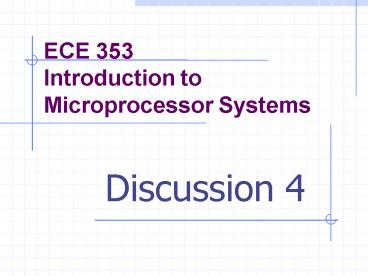ECE 353 Introduction to Microprocessor Systems - PowerPoint PPT Presentation
1 / 11
Title:
ECE 353 Introduction to Microprocessor Systems
Description:
Setup storage area. Setup parameters. Code: initialization. loop. read port values ... AREA FLASH, CODE, READONLY __main. MOV R0, #MAXITER ;max iteration count ... – PowerPoint PPT presentation
Number of Views:53
Avg rating:3.0/5.0
Title: ECE 353 Introduction to Microprocessor Systems
1
ECE 353Introduction to Microprocessor Systems
Discussion 4
2
Topics
- Look-up Table (LUT)
- Using loops
- QA
3
Look-Up Table (LUT)
- What? table of related values stored in
memory for use by the program. (Examples
temperature conversions, calibration info) - Why?
- - memory access may be much faster than doing
some set of calculations - - natural solution for database type of
information.
4
Look-Up Table (LUT)
- Example A.) Write a code fragment that will use
a look-up table to convert the value in the least
significant four bits of R0 to its ASCII
hexadecimal equivalent number and store result in
R1.
5
Look-Up Table (LUT)
Filename main.s Author ECE 353
student Description main program file for
Discussion 4 Look-up Table (LUT)
examples ARM use ARM instruction
set EXPORT __main AREA FLASH, CODE,
READONLY __main part A assumes value in
R0, so preload a sample value MOV R0,
11 AND R0, R0, 0xf only want least sig.
four bits ADR R2, HexLUT load start address
of LUT LDRB R1, R2, R0 do look-up B
__main HexLUT DCB "0123456789ABCDEF" END
6
Look-Up Table (LUT)
- Example B.) Write a code fragment that will use
a look-up table to return in R0 the 16-bit
square of the unsigned byte in R0. Only compute
the first and last three entries in the table.
7
Look-Up Table (LUT)
Filename main.s Author ECE 353
student Description main program file for
Discussion 4 Look-up Table (LUT)
examples ARM use ARM instruction
set EXPORT __main AREA FLASH, CODE,
READONLY __main part B assumes value in R0,
so preload a sample value MOV R0, 1 AND R0,
R0, 0xff only want lsb ADR R2,
SquareLUT load start address of
LUT MOV R0, R0, LSL 1 multiply by 2 since
half-word lookup LDRH R0, R2, R0 do
look-up B __main SquareLUT DCW 0, 1,
4 first three entries DCW 64009, 64516, 65025
last three entries END
8
Looping
- Write a code fragment that will get up to 100
characters from a byte I/O port at address
0x00011000 and store them in an array. If a zero
value is read from the port, store the zero and
then quit. Otherwise, when 100 characters have
been read, store a zero terminator in the array
and quit. - Outline
- Setup storage area
- Setup parameters
- Code
- initialization
- loop
- read port values
- check for zero value (branch to done if zero)
- store value
- update count
- loop if
- done - store zero
9
Looping
- Write a code fragment that will get up to 100
characters from a byte I/O port at address
0x00011000 and store them in an array. If a zero
value is read from the port, store the zero and
then quit. Otherwise, when 100 characters have
been read, store a zero terminator in the array
and quit. - Filename main.s
- Author ECE 353 staff
- Description main program file for discussion
problem Looping - ARM use ARM instruction set
- EXPORT __main
- AREA FLASH, CODE, READONLY
- __main
- loop
10
Looping
- Write a code fragment that will get up to 100
characters from a byte I/O port at address
0x00011000 and store them in an array. If a zero
value is read from the port, store the zero and
then quit. Otherwise, when 100 characters have
been read, store a zero terminator in the array
and quit. - Filename main.s
- Author ECE 353 staff
- Description main program file for discussion
problem Looping - ARM use ARM instruction set
- EXPORT __main
- MAXITER EQU 100
- PORT EQU 0x00011000
- AREA SRAM, DATA, READWRITE
- array SPACE MAXITER 1 need byte for
terminator - AREA FLASH, CODE, READONLY
- __main
- MOV R0, MAXITER max iteration count
- MOV R1, PORT port address
- ADR R2, a_array array address
- loop
11
Questions?































